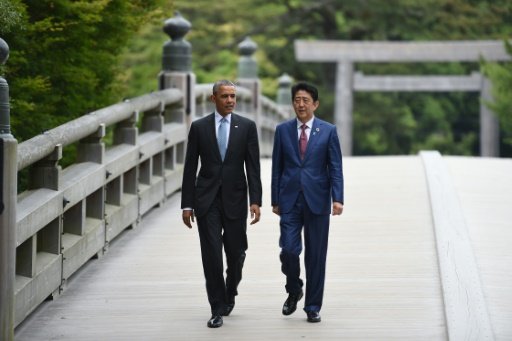
World leaders kick off two days of G7 talks in Japan with the creaky global economy, terrorism and refugees -AFP
ISE-SHIMA, JAPAN: Leaders of the Group of Seven industrial democracies meet in Japan Thursday for two days of talks.
Here are the hot topics up for discussion at Ise-Shima, a resort 300 kilometres (200 miles) southwest of Tokyo, and what to expect from the talks.
1) The economy
The world economy has struggled to get back on a sure footing ever since the global financial crisis struck in 2008.
The slowing of China’s once-dependable growth means G7 leaders now have to look elsewhere for a boost.
But the group — Japan, the US, Germany, France, Britain, Italy and Canada — is divided.
One side, led by Japan, favours spending — government stimulus. The other, led by Germany, thinks the fiscal largesse of recent years needs to be brought under control.
There are also cracks over currency. The US has Japan, amongst others, on a currency watch list for possible unfair practices, and warnings abound over “beggar-thy-neighbour” devaluations.
Expect: a final statement that supports a bit of both stimulus and austerity, but offers a firm rebuke on currency manipulation.
2) Brexit
Britain’s upcoming referendum on membership of the European Union will weigh heavily.
Many economists warn that if one of the EU’s largest economies leaves — a so-called Brexit — the knock-on effect for the bloc and the wider world could be substantial.
It could also add tens of billions of pounds (dollars) to British government borrowing and leave the country grappling with austerity into the next decade, the independent Institute for Fiscal Studies warned Wednesday.
Expect: the G7 to express their hope Britain will vote “remain”.
3) Islamist terrorism
After jihadist attacks in Brussels and Paris, the subject of Islamist terrorism is never far from leaders’ lips.
The gathering will be looking to present a united front and emphasise their determination to fight the scourge of extremism.
Expect: strong statements and rock-solid agreement.
4) Refugees
While the march of the Islamic State group across Syria and Iraq has been slowed, refugees continue to pour out of the broken states of the Middle East, many heading for Europe.
EU countries, notably Germany, have absorbed hundreds of thousands of people, but surging political populism — a far-right candidate came within a hair’s breadth of winning the Austrian presidency this week — has the continent’s mainstream politicians nervous.
Many are recognising that their voters are not on the same page as they are, and they want a solution to the tide of desperate people that does not involve taking in ever more of them.
Expect: pledges of more money to support refugees.
5) China
Beijing isn’t at Ise-Shima, but it will loom large over many of the discussions.
As well as its economic leverage — despite the slowing growth, its mighty GDP still makes it a force to be reckoned with — there are growing concerns in Western capitals over Beijing’s perceived belligerence.
That is particularly keenly felt by hosts Japan, who have butted diplomatic heads with their wartime enemy, notably over disputed territory in the East China Sea.
But Beijing’s increasingly assertive stance in the South China Sea — a stretch of water through which a huge chunk of global trade passes, but which China claims almost in its entirety — is a worry for Washington and its allies.
Expect: oblique references to the importance of “freedom of navigation” and “peaceful resolution of disputes”, even if no one mentions the words “China” or “Beijing”. -AFP
